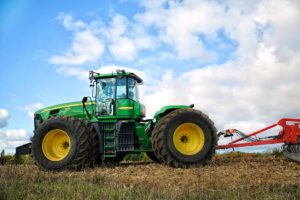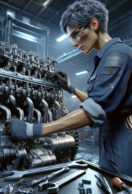There are a lot of diesel engines on a big farm, all of them housed in big machines essential to the operation of the farm. If you own or work on a farm, you know the trouble it causes when a piece of equipment breaks down. That's why it's so important to maintain your equipment just as well as you maintain your car--or better.
Learning How to Maintain Farm Equipment
 It's important to remember that the difference between noticing a problem before you operate a machine versus while you are operating it could be a difference of thousands of dollars. It's a good idea to inspect your equipment frequently and thoroughly so that you notice the first signs of a problem, which can be easily fixed at that early stage.
It's important to remember that the difference between noticing a problem before you operate a machine versus while you are operating it could be a difference of thousands of dollars. It's a good idea to inspect your equipment frequently and thoroughly so that you notice the first signs of a problem, which can be easily fixed at that early stage.
Here are some basic steps to get you started with properly maintaining your equipment.
- Read the owner's manual. Even if you have used a similar machine in the past, newer models and machines made by different manufacturers operate differently, and it's not a good idea to assume that they should be used or maintained in the same way. This is also where you'll go to learn what types of maintenance and what maintenance schedule the manufacturer recommends.
- Learn through use. After learning about the equipment from the manual, operate the equipment so that you can more fully understand how it works.
- Inspect equipment regularly, and especially before and after heavy use.
Basic Maintenance
While maintenance will vary widely depending on the type of equipment, there are some standard things you should expect to do regularly to keep your equipment running smoothly.
First, perform checks on the various aspects of the machine to make sure that everything seems to be in good repair and working as it should.
- Watch, listen, and smell for anything out of the ordinary.
- Inspect fluids. Make sure that oil, transmission fluid, and coolant are all at appropriate levels.
- Check for leaks. These will happen most often on or around hydraulic lines, oil lines, radiator hoses, and fuel lines.
- Check bolts and pins. Make sure they are in good shape and that nothing is loose.
- Check belts for any fraying or cracking.
- Check the tension level on belts and/or chains.
- Check tire pressure to ensure it's at the recommended level.
Next, make a maintenance schedule for each piece of equipment you own. Keep track of when you perform each maintenance activity, and keep in mind that if you use the equipment more heavily than is considered usual, you will need to do more frequent maintenance, as well.
- Grease and lubricate. Cables and chains will work better if lubricated regularly.
- Change the fuel filter. This should generally be done annually, if not more often.
- Change the oil and the oil filter. Check the manufacturer's recommendations for how often to do this, and keep in mind your level of equipment usage.
- Change hydraulic oil as recommended - likely once every 2-3 years, but possibly more often depending on the type of equipment.
Whenever anything seems amiss or you notice any abnormal smells or noises while operating the equipment, it's time to take your equipment to a knowledgeable diesel mechanic. Call All in the Wrist Auto and Diesel Repair for all your farming equipment maintenance needs.







